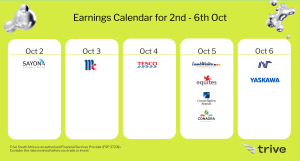
To summarise the earnings results in the last week, we look at the production food company, ConAgra Brands (NYSE: CAG), and touch on the earnings results for the maker of Corona Beer, Constellation Brands (NYSE: STZ). Wrapping up this week’s recap, we also highlight OPEC’s decision to cut production as well as the U.S. Non-farm Payrolls (NFP) latest data report.
ConAgra Brands (NYSE: CAG)
Chicago-based food production company reported a 6.1% rise in organic sales in its fiscal Q3 2023, a slowdown from 8.6% in Q2. However, the company’s adjusted gross margins were up over 4 percentage points from a year earlier to 28.1%, indicating a recovery in margins as price increases have finally caught up with inflation in the cost of inputs, despite more supply-chain disruptions than anticipated.
CEO Sean Connolly expects the popularity of frozen foods to grow as consumers eat out less in response to inflation. ConAgra’s results follow reports from General Mills and McCormick & Co. that packaged foods have withstood inflationary headwinds and are benefiting from aggressive price increases.
Constellation Brands (NYSE: STZ)
Maker of Corona Beer, Constellation Brands has announced an increase in its quarterly dividend and has reported better-than-expected earnings. The beer and spirits company slightly missed Wall Street’s revenue estimate, although beer sales for the quarter were in line with expectations. The company reported fiscal Q4 adjusted earnings of $1.98 per share on sales of almost $2 billion, beating the FactSet consensus estimate of $1.83 per share in earnings but falling short of analysts’ expected revenue of $2.01 billion.
“Beer business delivers strong fiscal 2023 net sales and operating income growth above outlook, despite inflationary headwinds, driven by the 13th consecutive year of volume growth from continued strong demand for our high-end brands,” the company said in its earnings release.
U.S. Non-farm Payrolls (NFP) Latest Data Report: 7 April 2023
The US added 236,000 jobs in March, according to the latest non-farm payrolls data published by the Bureau of Labor Statistics. The report also showed a drop of 0.1% in the unemployment rate to 3.5%. While the number of new jobs added was lower than expected, it still indicates a gradually weakening labor market due to the Federal Reserve’s interest rate increases. The Fed will use the report’s data to decide whether to halt or continue interest rate hikes at its next board meeting in early May. Other reports also suggest the labor market is cooling, with employers starting to slow hiring and an uptick in job cuts in March.
The Fed’s priority remains lowering inflation, which reached a 40-year high last year and is still high, despite slowing down. Some economists have criticized the Fed’s approach, saying that being too hawkish could push the economy toward a recession.
OPEC
The OPEC’s announcement of production cuts on Monday caught investors off-guard, as most expected production to remain steady according to prior guidance from some group members.
OPEC is responsible for the fixing and supply, and by extension, the price of oil.
The surprise cut of over 1 million barrels a day from May until the year’s end led to a sudden surge in oil prices. Brent crude, the global benchmark, jumped 5.31% to $84.13 a barrel, while WTI, the US benchmark, rose 5.48% to $79.83. Both were the sharpest price rises in almost a year. Energy giants BP (LON: BP) and Shell (LON: SHEL) saw their share prices rise on Monday, with both rising more than 4% each.
This surge in prices could potentially pose a new threat to global efforts to control inflation. Although daily changes in oil prices do not immediately affect fuel buyers, persistent higher prices could eventually result in higher costs for petrol and other products as oil is critical in most sectors.
Sources: Wall Street Journal, Bloomberg, BBC News, Trading View, Trading Economics, U.S. Bureau of Labor Statistics, CNN Business
Disclaimer: Trive South Africa (Pty) Ltd, Registration number 2005/011130/07, and an Authorised Financial Services Provider in terms of the Financial Advisory and Intermediary Services Act 2002 (FSP No. 27231). Any analysis/data/opinion contained herein are for informational purposes only and should not be considered advice or a recommendation to invest in any security. The content herein was created using proprietary strategies based on parameters that may include price, time, economic events, liquidity, risk, and macro and cyclical analysis. Securities involve a degree of risk and are volatile instruments. Market and economic conditions are subject to sudden change, which may have a material impact on the outcome of financial instruments and may not be suitable for all investors. When trading or investing in securities or alternative products, the value of the product can increase or decrease meaning your investment can increase or decrease in value. Past performance is not an indication of future performance. Trive South Africa (Pty) Ltd, and its employees assume no liability for any loss or damage (direct, indirect, consequential, or inconsequential) that may be suffered from using or relying on the information contained herein. Please consider the risks involved before you trade or invest.




